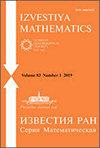On optimization of coherent and incoherent controls for two-level quantum systems
IF 0.9
3区 数学
Q2 MATHEMATICS
引用次数: 3
Abstract
This article considers some control problems for closed and open two-level quantum systems. The closed system's dynamics is governed by the Schrödinger equation with coherent control. The open system's dynamics is governed by the Gorini-Kossakowski-Sudarshan-Lindblad master equation whose Hamiltonian depends on coherent control and superoperator of dissipation depends on incoherent control. For the closed system, we consider the problem for generation of the phase shift gate for some values of phases and final times for which we numerically show that zero coherent control, which is a stationary point of the objective functional, is not optimal; it gives an example of subtle point for practical solving quantum control problems. The two-stage method, which was developed in [A. Pechen, Phys. Rev. A., 84, 042106 (2011)] for generic $N$-level open quantum systems for approximate generation of a given target density matrix, is modified here for the case of two-level systems. We modify the first ("incoherent") stage by numerically optimizing piecewise constant incoherent control instead of using constant incoherent control analytically computed using eigenvalues of the target density matrix. Exact analytical formulas are derived for the system's state evolution, the objective functions and their gradients for the modified first stage. These formulas are then applied in the two-step gradient projection method. The numerical simulations show that the modified first stage's duration can be significantly less than the unmodified first stage's duration, but at the cost of performing optimization in the class of piecewise constant controls. Bibliography: 72 titles.二能级量子系统相干和非相干控制的优化
本文研究了闭和开两能级量子系统的控制问题。封闭系统的动力学由具有相干控制的Schrödinger方程控制。开放系统动力学由gorini - kossakowski - sudarshana - lindblad主方程控制,其哈密顿量依赖于相干控制,耗散超算子依赖于非相干控制。对于封闭系统,我们考虑了某些相位值和最终时间的相移门的产生问题,对于这些相位值和最终时间,我们用数值证明了作为目标泛函的平稳点的零相干控制不是最优的;它为实际解决量子控制问题提供了一个微妙的例子。在[48]中开发的用于近似生成给定目标密度矩阵的通用$N$级开放量子系统的两阶段方法,在这里对两级系统的情况进行了修改。我们通过数值优化分段常数非相干控制来修改第一阶段(“非相干”),而不是使用使用目标密度矩阵的特征值解析计算的常数非相干控制。导出了系统状态演化、目标函数及其梯度的精确解析公式。然后将这些公式应用于两步梯度投影法。数值模拟结果表明,修改后的第一阶段持续时间可以显著小于未修改的第一阶段持续时间,但代价是在分段常数控制中进行优化。
本文章由计算机程序翻译,如有差异,请以英文原文为准。
求助全文
约1分钟内获得全文
求助全文
来源期刊

Izvestiya Mathematics
数学-数学
CiteScore
1.30
自引率
0.00%
发文量
30
审稿时长
6-12 weeks
期刊介绍:
The Russian original is rigorously refereed in Russia and the translations are carefully scrutinised and edited by the London Mathematical Society. This publication covers all fields of mathematics, but special attention is given to:
Algebra;
Mathematical logic;
Number theory;
Mathematical analysis;
Geometry;
Topology;
Differential equations.
 求助内容:
求助内容: 应助结果提醒方式:
应助结果提醒方式:


